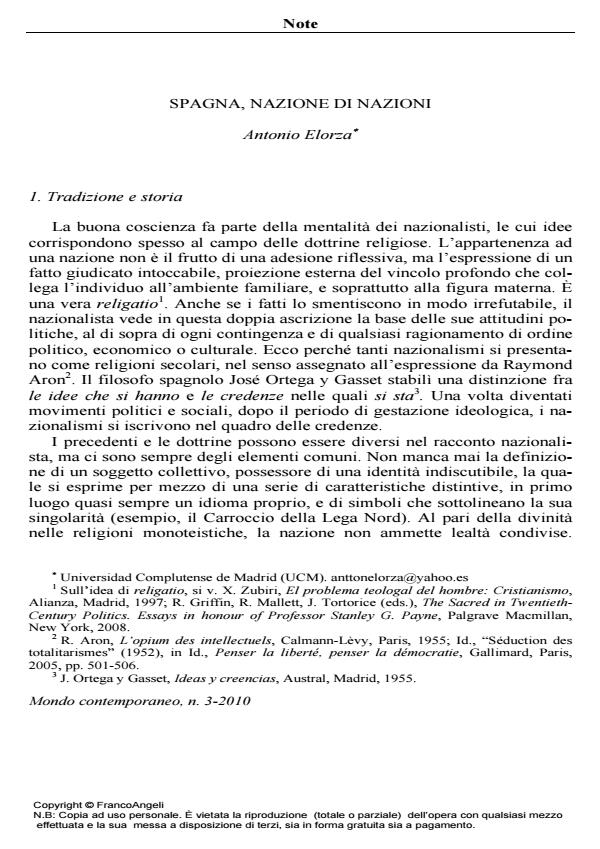Spain, a nation of nations
Journal title MONDO CONTEMPORANEO
Author/s Antonio Elorza
Publishing Year 2011 Issue 2010/3
Language Italian Pages 22 P. 137-158 File size 544 KB
DOI 10.3280/MON2010-003006
DOI is like a bar code for intellectual property: to have more infomation
click here
Below, you can see the article first page
If you want to buy this article in PDF format, you can do it, following the instructions to buy download credits

FrancoAngeli is member of Publishers International Linking Association, Inc (PILA), a not-for-profit association which run the CrossRef service enabling links to and from online scholarly content.
Spain does not have the same tradition of unitary State that France has, nor is it a multinational country such as Jugoslavia and Austria-Hungary were. Spanish identity was born in the Middle Ages and its roots date back to the Arab invasion in 711, when the losers acquired a consciousness of the «Spaniae ruina». Centuries later, the merge of the crowns under the Catholic Monarchs strengthened the background for such an identity, under a «monarchy of aggregation» which followed a course parallel with France, although the other identities, such as those of Catalunia and the Basque provinces, never disappeared. The French revolution abolished the administrative units of the old Regime and the process of nation-building developed without difficulties until the early 1900s, while the economic backwardness was behind the crisis of the nation State. At the same time, the fact that Catalunia and Biscay were the vanguards of industrialization favored the centrifuge dynamics of the elites, after the defeat of 1898 in the war against the US and the end of the empire had created the image of Spain as a moribund country. The modernization of the 1960s and 1970s was the basis for a new Spain, although the historical nationalities (Catalunia and the Basque Country in the first place) had already consolidated and the españolista nationalism of Franco's dictatorship had transformed nationalist demands into a democratic right. Finally, the 1978 constitution gave birth to a State with autonomies. It enshrined the autonomous development of the nationalities around the central axis of the Spanish "nation". This is why it’s appropriate to use the expression "nation of nations" to indicate a convergence of nation building processes such as the one carried out in Spain, although the conflicts between unity and aspiration to independence has not been reached yet.
Keywords: Spanish nationalism, Spanish history, modernization, autonomies, catalunianism, Basque provinces
Antonio Elorza, Spagna, nazione di nazioni in "MONDO CONTEMPORANEO" 3/2010, pp 137-158, DOI: 10.3280/MON2010-003006